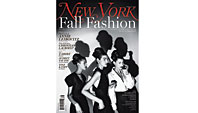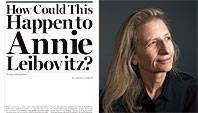
1. Andrew Goldman’s investigation into the imperiled personal finances of famed photographer Annie Leibovitz (“How Could This Happen to Annie Leibovitz?,” August 24) received much acclaim from commenters on nymag .com and from around the digital media. But Leibovitz’s self-inflicted predicament also turned many readers into scolds. “I think she was lucky enough to be paid ridiculous money for doing what she loves and she threw it away,” said one. “That she couldn’t be bothered to pay her vendors or autograph prints, after being paid millions, is ludicrous to me.” Another noted with a little more sympathy, “I feel for her, although her story is as common as that of any other American living in debt, it’s just on a higher scale.” Many others wrote with warm memories of personal encounters with the photographer. “I met Annie Leibovitz in 2007 at the High Museum of Art in Atlanta,” said one commenter. “Annie was so nice and down-to-earth, not at all what I expected she would be like. She was impressed that my best friend and I had come to the same museum in 1994 when we were in the ninth grade to see one of her exhibits and took a few moments to pose for a photo with us and sign her book.” Author Brett Leveridge also shared his experience with Leibovitz: “Leibovitz volunteered to shoot my author photo, and in doing so she couldn’t have been more generous with her time and talents. We spent the better part of a day on the shoot—she even waited patiently while I shaved off my goatee midsession (at her suggestion).” Rosanne Cash also wrote in to defend Leibovitz. “She did not ‘fly me in’ to sing at her daughter’s birthday party,” Cash wrote. “I live in Manhattan. I drove up to Rhinebeck in my own car. We’re friends. She asked me to sing at her daughter’s party, and I was delighted to do it. In return, she shot an album cover for me entirely on her own dime—an unbelievably generous act. Beyond that, she has photographed me several times, most often with a single assistant and an idea she wanted to explore, just for the love of getting a picture.”

A factual matter regarding the Leibovitz story. Goldman wrote in regard to a loan agreement that Leibovitz entered into with a company called Art Capital that, “Under the terms of the agreement, says a person familiar with the loan, Art Capital could be entitled to up to 22.5 percent of all the proceeds from the sale of any of Leibovitz’s work—even for two years after she’s paid off the loan. And that percentage could increase to close to 50 percent if she were to default.” New York Magazine has since learned that those numbers were erroneous. The actual commission rates on the sale of the collateral underlying the loan are 10 percent on Leibovitz’s real estate and 15 percent on the sale of her work. In the event Leibovitz defaults on the loan, a default commission of 25 percent, and after costs as low as 14 percent, would be realized. New York regrets the error.

2. Forty-seven minutes evidently wasn’t enough to fully discuss health care, so Peter Peterson, subject of last week’s encounter, (“Intelligencer: 47 Minutes With Peter Peterson,” by Steven Gaines, August 24) wrote in to expand on the points he’d raised. “The costs of the last few months of life are simply one of many cost drivers. I would not want the reader to assume that I believe the Obama administration is not fully aware of the cost drivers,” he wrote. “Alas, the political problem remains the same—doing something about them by making tough choices and shared sacrifices is not deemed politically acceptable. I should say that I think highly of your journalist. Nonetheless, I fear the brevity of the article and our conversation resulted in a limited context of my position on health-care costs and proposed reform measures.”
Send correspondence to: comments@nymag.com